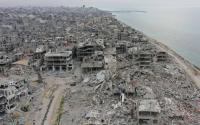LeaderSaturday March 8, 2003
If the UN security council were not in such a jam over Iraq, yesterday's progress report by Hans Blix would have been viewed as a routine, rather dull affair. But the same intense US-British diplomatic and military pressure that Mr Blix says has facilitated his work to date is now threatening irrationally to wreck the entire process. The chief weapons inspector rendered a relatively upbeat assessment, offering only mild criticisms of Iraq. He repeatedly suggested that there were constructive ways forward to resolve outstanding disarmament issues, in particular by focusing on "clusters" of remaining tasks. He complained about missing documents and incomplete records; but he welcomed Iraq's destruction of its proscribed al-Samoud missiles as a "substantial measure".
Mr Blix indicated that two US claims of Iraqi deception, relating to vehicles and hidden underground facilities, had been investigated; so far, nothing untoward had been found. Recalling resolution 1441's demand for "immediate, unconditional and active" cooperation, he noted that while collaboration had not been instant, Iraq had dropped attempts to set conditions and was actively if not proactively assisting his work. Quite logically given this context, Mr Blix concluded that inspections should continue for a few more months. His considered message was that there was every reason to hope they will ultimately succeed.
For the Bush administration, however, it is clear that what Mr Blix has to say carries less and less weight. His reasoned, fact-based approach was not reciprocated in Colin Powell's response. The US secretary of state was at pains to pick holes, emphasising the negative, decrying Iraq's "grudging" behaviour and repeating earlier claims of Iraqi cheating. Ignoring evidence of present-day com pliance, he again resorted to the history of past Iraqi non-cooperation. Mr Powell is entitled to feel dissatisfied about Iraqi foot-dragging and time-wasting. It is certainly true that Iraq can and should do more, faster. But Mr Powell, if he were as objective as Mr Blix and not politically committed to war, would surely also admit that this report, like its predecessors, provides no basis or justification for a resort to military force at this time.
Despite Mr Powell's demand for urgent action, most other security council members plainly do not share his view at present, nor do they seem inclined to follow his recommendations. Similarly, Downing Street's snap post-Blix judgment that Iraq is in material breach of 1441 is no more persuasive than before, and perhaps less so now. Nothing said yesterday was likely to dispel the well-founded scepticism of America's and Britain's opponents. Joschka Fischer, speaking for Europe as much as for Germany, said that a "historic turning point" had been reached. War was the wrong way to go. Enhanced inspections offered a real, workable alternative and, perhaps, a future collaborative model.
Britain's bid to broker a compromise that delays war for a week and salvages the fabled "second resolution" is now a truly desperate business. On one side stands an obsessive, unyielding George Bush, insisting the US needs nobody's "permission" to attack whoever it pleases and counting on Britain's loyal support. On the other side stands almost the entire United Nations, including nearly all our closest allies. Exactly how Tony Blair and the hapless Jack Straw ever got into this ridiculous, damaging and dangerous position will intrigue historians for years to come. Exactly how they get out of it - and whether they can at all - we will know in the next few climactic days.






